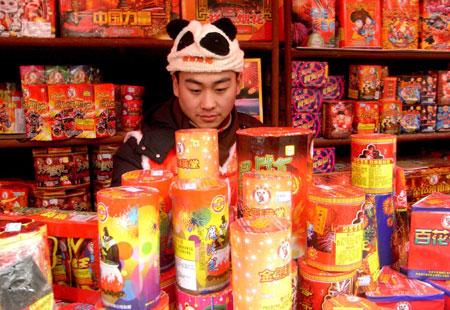
Panda Fireworks Group seeks more mergers and acquisitions for domestic and global expansion.[Photo/China Daily]
GUANGZHOU - Panda Fireworks Group, the only market-listed Chinese fireworks firm, and the one responsible for the displays at the Beijing Olympic Games, Shanghai World Expo and Guangzhou Asian Games, will seek more mergers and acquisitions (M&As) for domestic expansion, and will bid for contracts at all major international sporting events.
M&A is a shortcut to gain permits for selling fireworks, which are listed as hazardous goods, at various locations in the country, said chairman Zhao Weiping.
The company, which started as an export business in 1989, has seen domestic sales quadruple during the past two years.
Having entered the domestic market in 2007, after the gradual lifting of a ban on fireworks in major cities in 2006, Panda has obtained permits to sell its goods in seven cities.
It usually takes about three years to build a warehouse and logistics chain, due to strict standards for hazardous goods, and a market presence, Zhao said, predicting stronger domestic growth in 2011 after racking up growth of around 20 percent this year.
Revenue will also be stronger after a merger with the Hunan-based fireworks company Bongxi, which it acquired for 62.7 million yuan ($9.5 million) in April.
Birthday celebrations and corporate events may create a huge market for fireworks, once the market matures and more products become available, Zhao said, adding that Panda is considering commercial fireworks shows as another source of revenue.
The company has been responsible for government-funded Chinese New Year firework displays in Guangzhou during the past decade.
The company's participation in the Beijing Olympic Games, Shanghai World Expo and Guangzhou Asian Games, has brought benefits in the form of brand building and an enhancement of its innovation strength, Zhou said, adding that "the Beijing Olympic Games turned fireworks into value-added cultural products".
At a display at the Great Wall during the Beijing Olympics, Panda used chip technology to guide the fireworks and ensure more accurate positioning and lower smoke levels.
Panda will also invest in its research institute for new technology and environmental applications, Zhao said.
Zhao and the company's design director are part of the design team for a display at the Guangzhou Asian Games. The company is spending about 2 million yuan on its creativity workshop every year.
The Chinese fireworks market, estimated at 23 billion yuan a year, is bigger than all combined overseas markets, which stand at 3 billion yuan on a Free On Board basis, and are almost exclusively served by Chinese exports, Zhao said.
The company's export business had been in decline since 2007 due to the global economic recession, and only started to recover last year. However, it will take a long time for it to return to the pre-crisis level, Zhao said.
After winning a bid to provide fireworks for events in Macao and Dubai last year, Panda is now focusing on the Shenzhen Universiade (also known as the World Student Games) next year, and all other major international sports events, he said.




